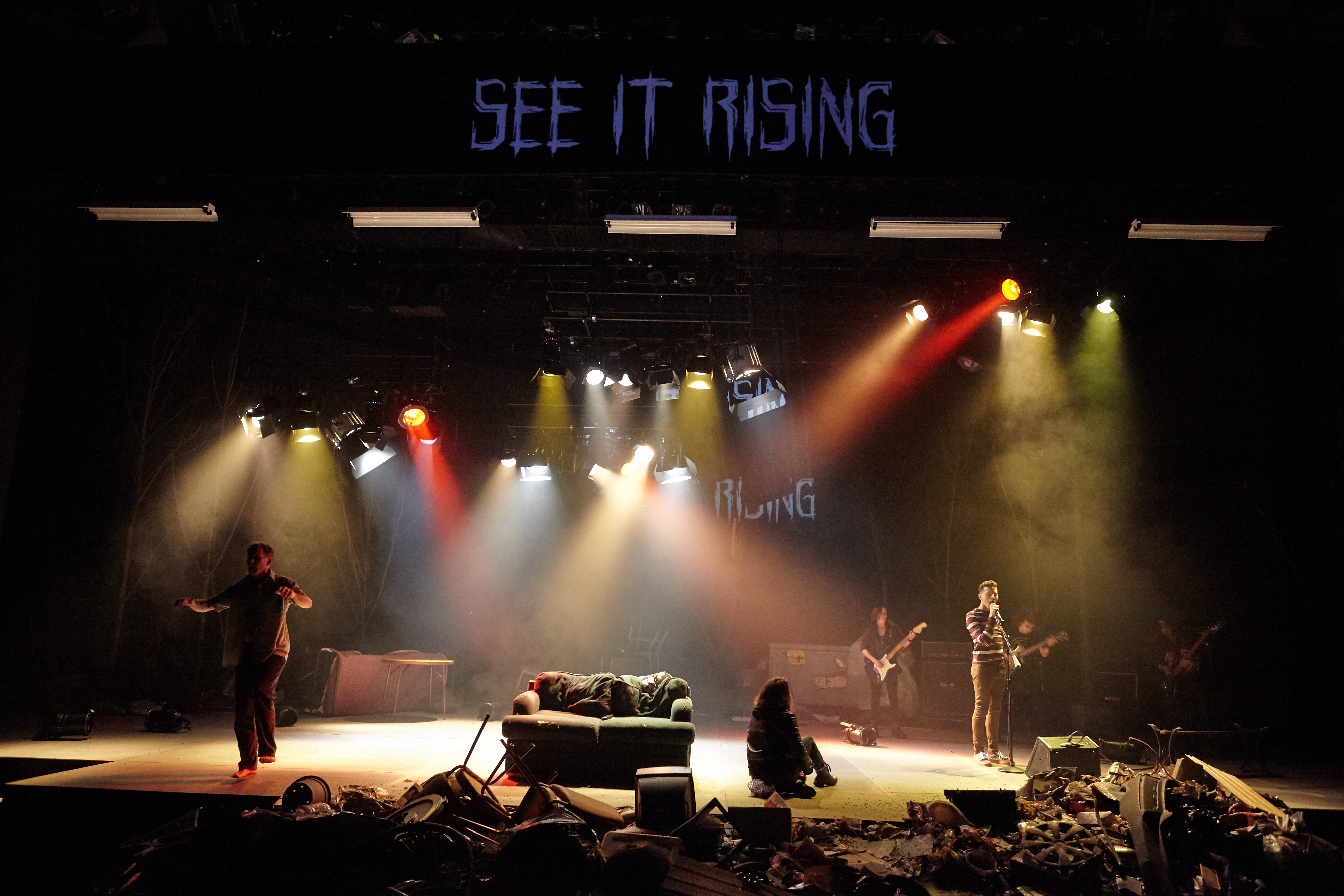Caroline Ruark, Dee Scott, Jennifer Siow and Crystain Wiltshire in You Better Sit Down: Tales From My Parent’s Divorce.
Photo-Eve Theatre Company
You Better Sit Down: Tales From My Parents Divorce
Created by Caitlin Miller, Robbie Collier Sublett, Jennifer R. Morris and Matthew Maher
Directed by Anna Neikirk
Review by Eli Keel
Entire contents copyright © 2014 by Eli Keel. All rights reserved.
You Better Sit Down: Tales from my Parent’s Divorce is a flawed piece, but it is bravely flawed, and one can’t help but be impressed by director Anna Neikirk’s vision and moxy.
Originally constructed by documentary theatre company The Civilians, You Better Sit Down is composed of four intercut monologues created from a series of interviews that The Civilians conducted with their divorced parents. The monologues deliver a rough timeline of each relation ship; including how they met, what it was like, what went wrong, how it ended, and what their lives are like post divorce.
Neikirk’s re-staging comes to us (unofficially) from the University of Louisville, by way of the Slant Culture Theatre Festival.
The piece consists of four actors, four chairs, and four props. Once they enter, the actors barely leave the stage, or even get up out of their chairs. For the majority of the production they sit under the audience’s stare, without the benefit of black outs, scene changes, or even interaction with each other.
It’s a heck of a challenge for these four relatively young actors, presumably classmates of Neikirk’s at the University of Louisville.
Each actor has real moments of connection and times that they truly inhabit their characters. For the most part the long conversational monologues don’t reach too high or too low in the emotional spectrum. Their task is to simply be that character, often while sitting still, with no relief for the better part of an hour.
The levels of success the performances attain are impressive though imperfect. Each actor has many moments when they slip out of character, and it’s at those moments that the play derails and the audience becomes very aware that there is very little action, and no conflict in this script.
Crystian Wiltshire seems the most capable of staying fully in character, but he alone among the actors has the luxury of playing two characters, a husband and wife who have divorced. The interplay between the he said/she said is the closest thing we see to scene work, and provides some of the most enjoyable moments of the play.
You Better Sit Down is Neikirk’s Senior Honors Thesis. She conceived the idea for this re-staging and submitted her proposal to Slant back in the spring, then submitted a proposal to her thesis committee, and sat back with her fingers crossed and hoped everyone said yes.
Neikirk is aware that eschewing standard story tropes and blocking is a gamble, but she’s gambling that it will force audiences members to grapple with the issues, instead of getting lost in the action. She’s essentially offering the audience Brecht light.
In the curtain speech Neikirk points to an insert in the audience’s programs, and asks them to take a survey after the play is over.
By using a QR reader or visiting a web address, attendees are asked three questions: if their parents are divorced, if they themselves are divorced, and if the play made them more likely to discuss divorce.
It seems like it’s almost an after thought, as Neikirk’s simple inclusion of a quick Survey Monkey generated survey could easily be ignored by audience members. Still, it serves as a sharp reminder of the digital divide in theatre. Millennials use these tools without thinking, but the current crop of Gen X’ers running so many of Slant’s companies seem to be making theatre that doesn’t yet recognize the existence of the internet despite the fact that the majority of Slant audience members have smart phones and/or computer access.
Neikirk also has presented the most diverse cast at Slant, due presumably to her proximity as a student to the University of Louisville’s African-American Theatre Program. For a theatre festival whose stated mission is trying to reach new audiences, perhaps a few more people of color onstage could help them lure more people of color to their audiences.
Additionally this play (by virtue of its origins) highlights a curious absence at Slant: The University of Louisville Theatre Department. While it made sense for the more established U of L department to keep its distance during Slant’s formative first few years, their lack of involvement is starting to stand out. Slant has an open call for proposals in the spring, and I would love to see the department offer something next year. Perhaps Slant would do well to make sure that a sincere invitation is issued to U of L next year.
Neikirk’s purpose in staging this play was to create discussion around the topic of divorce, but her purposeful embrace of issue-oriented theatre suggests it’s probable she knew her diverse cast and University of origin would start tongues wagging on other subjects as well.
You Better Sit Down: Tales from my Parent’s Divorce ultimately fails on many theatrical levels, but it succeeded in convincing this reviewer that Neikirk and her actors are artists worth watching; here’s hoping they all stick around for a while after graduation.
You Better Sit Down: Tales From My Parents Divorce
Saturday, November 15 – 4 pm
Sunday, November 16 – 7:30 pm
Saturday, November 22 – 7:30 pm
Part of the Slant Culture Theatre Festival
Walden Theatre
1123 Payne Street
Louisville, KY 40204
(502) 589-0084
Tickets $12
http://www.slantculture.com/tickets/
 [box_light]Eli Keel is a Louisville based playwright, poet, story teller, and freelance journalist. He has been published in Word Hotel, his plays have been produced by Theatre [502] and Finnigan Productions, and he has was invited to read his work at the 2014 Writer’s Block. He is a frequent contributor to Insider Louisville, where he has been given the (informal) title of “Chief of the Bureau of Quirk.”[/box_light]
[box_light]Eli Keel is a Louisville based playwright, poet, story teller, and freelance journalist. He has been published in Word Hotel, his plays have been produced by Theatre [502] and Finnigan Productions, and he has was invited to read his work at the 2014 Writer’s Block. He is a frequent contributor to Insider Louisville, where he has been given the (informal) title of “Chief of the Bureau of Quirk.”[/box_light]





